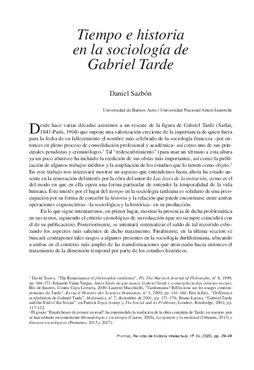Tiempo e historia en la sociología de Gabriel Tarde
Time and history in Gabriel Tarde’s sociology

Ver/
Fecha
2020Autor
Sazbón, DanielResumen
Desde hace varias décadas se asiste a una recuperación de la figura de Gabriel Tarde (1843-1904) que supone una valorización creciente de la importancia de quien fuera uno de los nombres más celebrados de la sociología francesa, así como importante penalista y criminólogo. En este trabajo nos detendremos en el modo en que en su sociología opera una forma particular de entender la temporalidad de la vida humana. En lo que sigue intentaremos, por un lado, mostrar la presencia de dicha problemática en su producción, esbozando los aspectos más salientes de dicho tratamiento, y por otro lado contraponer tales rasgos a algunos presentes en la sociología durkheimiana, ubicando a ambas en el contexto más amplio de las transformaciones que atravesaba el tratamiento de la dimensión temporal tanto en la sociología como en la historia. The last decades have shown an increase of interest in the work of Gabriel Tarde (1843-1904), leading to the growing appreciation of the importance of one of the most celebrated French sociologists of his time, as well as one of the major criminologists. In this paper we will concentrate on one aspect of Tarde’s work that hasn’t been accounted for in the renewal of interest in his writings: its particular understanding of the temporality of human life. In the following pages we will seek, first, to demonstrate the place of this problematic in his production, sketching the more salient aspects of his treatment of time, and second, to contrast it with the understanding of time in Durkheimian sociology. In order to do so, we will place both authors in the wider context of the transformations that the treatment of temporality was then undergoing in both sociology and the historical sciences.
